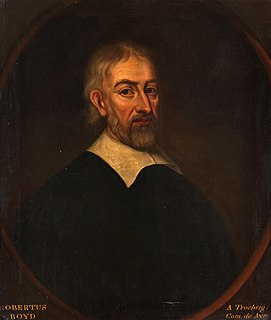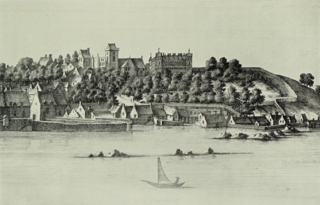Robert Baillie was a Church of Scotland minister who became famous as an author and a propagandist for the Covenanters.
The Regius Professorships of Divinity are amongst the oldest professorships at the University of Oxford and the University of Cambridge. A third chair existed for a period at Trinity College, Dublin.

John Caird DD LLD (1820–1898) was a Scottish theologian. He entered the Church of Scotland, of which he became one of the most eloquent preachers. He served as the Principal of the University of Glasgow from 1873 until 1898.
The White's Chair of Moral Philosophy was endowed in 1621 by Thomas White, Canon of Christ Church as the oldest professorial post in philosophy at the University of Oxford.
The Regius Chair of Medicine and Therapeutics is considered the oldest chair at the University of Glasgow, Scotland. It was formed in 1989 from the merge of the Regius Chairs of the Practice of Medicine and of Materia Medica. The chair has so far had two occupants, Professor John Reid, who was previously Regius Professor of Materia Medica and - since 2010 - Professor Anna Felicja Dominiczak, the first woman to have ever held the post.
The Chair of Mathematics in the University of Glasgow in Scotland was established in 1691. Previously, under James VI's Nova Erectio, the teaching of Mathematics had been the responsibility of the Regents.
The Professor of Hebrew and Semitic Languages is a position at the University of Glasgow in Scotland. It was established in 1709 by Queen Anne as the Chair of Oriental Languages. The title was changed in 1893.

The Regius Chair of Law at the University of Glasgow was founded in December 1713 with an endowment by Queen Anne. It is one of twelve Regius Professorships within the University of Glasgow. The first holder of the chair, William Forbes, was appointed in 1714. The current holder, James Chalmers, was appointed in 2012.
The Chair of Ecclesiastical History of the University of Glasgow is the oldest chair of ecclesiastical history in the United Kingdom.
The Chair of Moral Philosophy is a professorship at the University of Glasgow, Scotland, which was established in 1727.
The Professorship of Divinity and Biblical Criticism at the University of Glasgow was founded in 1861. The patron was formerly the Crown. Since 1935, the University Court, acting on the recommendation of a Board of Nomination consisting of representatives of the University Court and of the General Assembly of the Church of Scotland, appoints the Professor.
The Regius Chair of Botany at the University of Glasgow is a Regius Professorship established in 1818.

Robert Blair was a Scottish presbyterian minister who became a Westminster Divine and Moderator of the General Assembly of the Church of Scotland in 1646, after failing to emigrate to Boston in 1636. Born in Irvine in 1593, the sixth son of John Blair of Windyedge, a merchant-adventurer and cadet of Blair, and Beatrix Mure of the Rowallan family, he gained an MA at the University of Glasgow in 1612 and became regent there in 1615. When the episcopalian John Cameron was appointed Principal, Blair resigned and went to Ireland, to become minister of a Presbyterian congregation at Bangor, County Down. He was ordained for it by Robert Echlin, Bishop of Down and Connor, Blair was "very careful to inform... of what accusations had been laid against me of disaffection to the civil powers, whom he was the use of the English liturgy nor Episcopal government.... I declared my opinion fully to the Bishop at our first meeting... [who] said to me, 'I hear good of you, and will impose no conditions on you.'" Echlin, however, turned against him. In September 1631, he was suspended from his ministry and on 4 May 1632 deposed. Though bent on emigrating to New England, the ship in which he and other ministers sailed was driven back by weather, a sign, Blair thought, that his services were still required at home. He dodged an order for his arrest by escaping to Scotland and was admitted to the Second Charge of Ayr in July 1638. After periods in Scotland and Ireland, he accompanied the Scottish army to England in 1640 and helped to negotiate the 1641 Peace of Ripon. In 1646, Blair was elected Moderator of General Assembly, then Chaplain-in-Ordinary to King Charles I. He was also on a committee endeavouring in 1648 to get Cromwell to establish "a uniformity of religion in England." He was summoned to London by Cromwell in 1654, but excused himself on grounds of ill-health. On the establishment of episcopacy he was removed from his charges in September 1661, confined to Musselburgh, then to Kirkcaldy for three and a half years, and then to Meikle Couston, Aberdour, Fife, where he died on 27 August 1666 and was buried.

Robert Boyd of Trochrig (1578–1627) was a Scottish theological writer, teacher and poet. He studied at the University of Edinburgh and after attending lectures by Robert Rollock, prosecuted his studies in France, and became a minister in the French Church. All accounts represent him as a most accomplished scholar. A friend said of him, with perhaps some exaggeration, that he was more eloquent in French than in his native tongue; and Livingstone tells us that he spoke Latin with perfect fluency, but that he had heard him say, if he had his choice, he would rather express himself in Greek than in any other language. The Church of Boyd's adoption, which had given Andrew Melville a chair in one university, and Sharp a chair in another, was not slow to do honour to their brilliant countryman. He was made a professor in the protestant Academy of Saumur; and there for some years he taught theology. He was persuaded, however, in 1614 to come home and accept the Principalship of the Glasgow University. Though he was far from extreme in his Presbyterianism, he was found to be less tractable than the king and his advisers expected, and was obliged to resign his office. But he was long enough in Glasgow to leave the impress of himself on some of the young men destined to distinction in the Church in after years.

David Dickson (1583–1663) was a Church of Scotland minister and theologian.

John Strang (1584–1654) was a Scottish minister and Principal of Glasgow University. He was a signator to the National Covenant of 1638.
John Simson (1667–1740) was a Scottish "New Licht" theologian, involved in a long investigation of alleged heresy. He was suspended from teaching as Professor of Divinity at the University of Glasgow for his later life.

Michael Potter was a covenanter. He graduated from Edinburgh on 27 July 1663. He was licensed to preach the gospel in the year 1673. He was a tutor to the family of George, the Laird of Dunglass of that ilk. He was ordained by presbytery for the adherents in the parish of St. Ninians in 1673. He was elected a schoolmaster to Culross by the magistrates. This led to them being summoned before the Privy Council in 1677.






